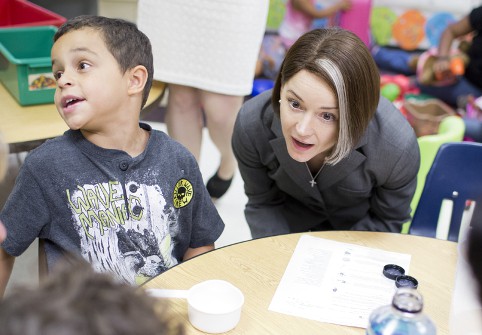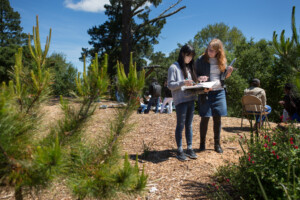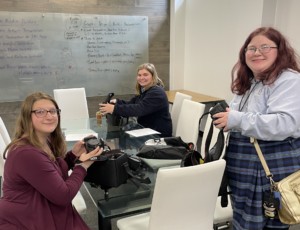Rethinking the Education Experience of Future Generations

By: Deborah A. Gist, R.I. Commissioner of Elementary and Secondary Education, and Lisa Duty, Partner at The Learning Accelerator.
Every student comes to school with a unique set of skills, abilities, needs, and aspirations. But in the traditional classroom environment, even the best educators are challenged to reach every child in a way that meets her or his personal needs. Through blended learning – which brings together traditional face-to-face instruction and online instruction under the guidance of a skilled teacher – students can proceed at their own pace and can pursue and develop their own interests and passions. This is what’s happening in many classrooms in Rhode Island public schools today.
The need for a new approach
Across Rhode Island, a growing number of schools are engaged in blended learning and teachers are leading the way in demonstrating how to wield new technologies to improve and expand classroom instruction. To support this initiative, RIDE and other public agencies, professional-educator membership organizations, technical-assistance providers, business-sector supporters, and other partners have stepped up to provide resources and expertise to advance blended learning across the state. In applying the Framework for Cultivating High-Quality Blended Learning at the State Level, RIDE and its partners are laying the groundwork and investing in systems level transformation rather than relying solely on change taking place one school at a time.
In it together
We believe that real transformation requires a range of competencies, resources, and influence that can be obtained only from a broad coalition of actors—working both inside and outside of the system. None of us “owns” the solution or the capacity to produce the change we seek in education; rather, we are counting on the power of many organizations and people– including teachers, students, and families– working together to transform education. In Rhode Island more than 50 organizations and partnerships are taking part in the development of blended learning; among them are the Highlander Institute, the Rhode Island Association for Supervision and Curriculum Development, the Rhode Island Foundation, Learning First Alliance, the Rhode Island Society of Technology Educators, the Rhode Island Middle Level Educators, and the Rhode Island School Superintendents’ Association. Each organization has its own mission and its own constituency, but all share a commitment to preparing students for success and to seeking innovative ways to transform the classroom environment.
Scaling new capacity
Right now in Rhode Island, we’re trying to determine, at the state level, how we can bring about system-wide change that transforms instruction and touches the life of each student.
Throughout this process, we ask ourselves such questions as: What is RIDE best positioned to do? What are our core competencies? How can we work best with our partners across the state to create new forms of schooling? How will we fund the shift to blended learning? We all want to use technology to transform our schools and classrooms, but how will we make those initial investments? Embracing blended learning means changing our current practices, and this goes not just for schools and districts but also for state-level membership organizations, networks, foundations, technical-assistance providers, and of course RIDE itself.
What the Framework could mean for other states
Many believe that states should develop and adopt policies to advance blended learning, but we argue that advancing blended learning goes far beyond policy. Implementing the Framework is a means of taking disciplined action, not just layering new blended learning opportunities on top of old forms of schooling (or new statewide initiatives on top of old statewide initiatives no matter where they originate).
States have to commit resources to provide support for implementation (such as grants to districts, schools, and individual educators), communications and learning opportunities to share practices across schools and districts, and a vision of what our schools and classrooms can look like not on the far horizon but in the near future.
The Learning Accelerator recently released an important resource, A Framework for Cultivating High-Quality Blended Learning at the State Level, for state leaders who share its goal of achieving improved student outcomes within an innovative culture. The Rhode Island Department of Education (RIDE) and thousands of Rhode Island teachers and students are blazing a trail for the nation, demonstrating how to bring more personalized student learning experiences into our classrooms.
 Deborah A Gist (@DeborahGist) is the Rhode Island Commissioner of Elementary and Secondary Education. She began her career in education 25 years ago as an elementary-school teacher in Fort Worth and, later, in Tampa, where she conceived, designed, and initiated a literacy program serving families in 108 elementary schools in Hillsborough County. Deborah holds a master’s degree in public administration from the Harvard University John F. Kennedy School of Government, and a doctoral degree in education from the University of Pennsylvania.
Deborah A Gist (@DeborahGist) is the Rhode Island Commissioner of Elementary and Secondary Education. She began her career in education 25 years ago as an elementary-school teacher in Fort Worth and, later, in Tampa, where she conceived, designed, and initiated a literacy program serving families in 108 elementary schools in Hillsborough County. Deborah holds a master’s degree in public administration from the Harvard University John F. Kennedy School of Government, and a doctoral degree in education from the University of Pennsylvania.






0 Comments
Leave a Comment
Your email address will not be published. All fields are required.